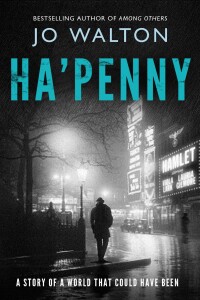 Jo Walton’s 2006 novel Farthing was set in an imagined Britain-as-it-might-have-been, if instead of battling Hitler the British had let him have continental Europe in exchange for leaving them their island of autonomy and freedom. As the story unfolded, though, it became clear that the “Farthing Peace” was not what it seemed, and that oppression and prejudice must be fought from within.
Jo Walton’s 2006 novel Farthing was set in an imagined Britain-as-it-might-have-been, if instead of battling Hitler the British had let him have continental Europe in exchange for leaving them their island of autonomy and freedom. As the story unfolded, though, it became clear that the “Farthing Peace” was not what it seemed, and that oppression and prejudice must be fought from within.
In Ha’Penny Walton picks up the story a short time later. The first book’s device of having alternate chapters with different narrators is again used effectively here. One half belong to Inspector Carmichael, a Scotland Yard detective assigned to the case of an actress who seems to have been bombed in her Hampstead home. The other half in this book are narrated by Viola Lark, another actress, who in the first chapter is offered the part of Hamlet (yes, you read that right), and quickly finds out that this may literally be the role of a lifetime.
Viola replaces her Farthing counterpart, Lucy Kahn, a peer’s daughter who made the immense faux pas of marrying a Jew, and learned the hard way that her husband’s declaration that “there are no fascists in England” was not exactly accurate. Viola is more levelheaded than Lucy, indeed quite single-mindedly preoccupied with her craft, and with escaping from her dreadful family (loosely based on that of Nancy Mitford).
Unlike Lucy, Viola has no personal involvement in the Jewish question, and her attitude is “If there was one thing the Farthing Peace had settled once and for all it was that the Continent was its own lookout. Why should I care what Hitler . . . was doing to the Jews of Europe, even if I believed it?” When against her will she becomes involved, from the conspirators’ end, in the same bombing case Carmichael is investigating, she learns why she should care, as both sides race toward an explosive conclusion.
As with its predecessor, the strength of Ha’Penny is in its finely drawn characters and period detail. Viola’s story is a fascinating glimpse into the theater of the 1940s. And Inspector Carmichael’s moral and personal quandaries, introduced in Farthing, are deepened further. There is a hint at the fate of Lucy and David Kahn, and another ending-with-a-twist that offers some hope that the monstrously mounting injustice of the first two books may be countered in a sequel. (The third book in the Small Change trilogy, Half a Crown, is in process).
“Entertaining” is not the right word to use for Jo Walton’s novels. They masterfully use the trappings of light fiction, detective stories and thrillers, but the questions and ideas they evoke are not things to be thrown aside lightly when the reading is done. They are absorbing, compulsive reading, bringing much enjoyment, but also much discomfort. I look forward to the next installment of this unusual alchemical combination.
Jo Walton discusses aspects of life, work, and literature in a blog on her website.
(Tor, 2007)
